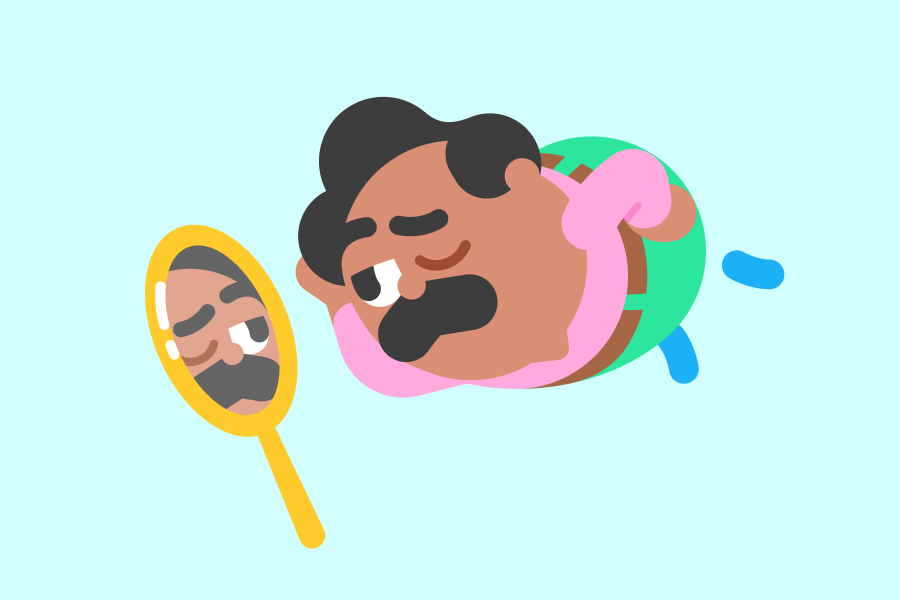Reflexive pronouns have a number of different uses in English, so learners will find them in unexpected places! Luckily, there are just a few forms to learn, and these tips will help you identify and practice the most common situations where you’ll need a reflexive pronoun.
In this post:
What are reflexive pronouns in English?
When to use reflexive pronouns in English
Tips for learning English reflexive pronouns
Examples of reflexive pronouns in English
What are reflexive pronouns in English?
Reflexive pronouns are used when the subject of a verb is also the object of the verb: The action is caused by the subject, and it happens to the subject, too! 🤯 For example, in I bought myself a new book, “I” am the person buying the book *and* receiving it—the book was for me.
Here are all the reflexive pronouns in English:
| Subject pronoun | Reflexive pronoun |
|---|---|
| I | myself |
| you | yourself |
| he | himself |
| she | herself |
| it | itself |
| we | ourselves |
| you all | yourselves |
| they | themselves |
The reflexive pronouns are formed by combining a personal pronoun with -self for singular forms and -selves for plurals. Note that most forms use the possessive adjective (my, your, etc.), but a couple use the object pronoun form instead (himself, themselves).
When to use reflexive pronouns in English
There are 3 main uses of reflexive pronouns in English: to show that the subject and object are the same, to put emphasis on a noun, and with by or for to indicate that something happened on its own. Let’s look at a few examples!
1️⃣ Subject and object are the same
When the subject is the same as the object, use a reflexive pronoun for the object. This works when it’s the object of a verb *or* the object of a preposition!
- I don’t like listening to myself sing.
- Lucy made herself a radio out of tin cans.
- We taught ourselves to rollerblade.
2️⃣ Emphasis on a noun
Reflexive pronouns are also used to emphasize a noun, for example, to show that the subject really is the one who is doing the action of the verb.
- She couldn’t believe they made the costumes themselves!
- The green owl himself made an appearance at midnight.
- Could you call him yourself next time?
3️⃣ With by or for to show that something happened on its own
You’ll find reflexive pronouns used with the prepositions by and for to show that the subject is doing the action without any help.
- Did you all make the cake all by yourselves?
- I’ll need to see that for myself.
- For the test, Junior will need to calculate it by himself.
Tips for learning English reflexive pronouns
Mastering reflexive pronouns in English will take time and practice, so use these tips to keep progressing in your learning:
- Focus on common uses first. Some uses of reflexive pronouns are more advanced than others. Start by studying verbs and reflexives for cases when the subject and object are the same, and leave reflexives for emphasis until you’re more comfortable with personal pronouns.
- Remember the exceptions. The general rule for reflexives is that they are formed with the possessive adjectives + self/selves, but remember the exceptions with the object pronoun forms instead. You’ll have to memorize those!
- Beware other prepositions. Not all prepositions will work with reflexive pronouns—for example, you won’t use reflexives when talking about location, as in I put the glass near me. You’ll find reflexives with by and for specifically for talking about things that happen without help.
- English speakers vary! English speakers don’t all use reflexive pronouns the same way—in fact, these days there are some new uses of reflexive pronouns evolving! You might hear reflexives used in ways you don’t expect, but don’t worry: Practice the most common uses for your own English.
Keep *yourself* moving ahead in English
Reflexive pronouns are straightforward to memorize, and you can focus on their most common uses as you continue in your English journey.
Examples of reflexive pronouns in English
| Subject pronoun | Reflexive pronoun | Example with reflexive pronoun |
|---|---|
| I | myself | I sing to myself in the shower. |
| you | yourself | You always make yourself laugh with that joke! |
| he | himself | He’ll give himself a headache if he doesn’t rest. |
| she | herself | Lin kept herself busy while she waited for the call. |
| it | itself | That little bird locked itself in the garage. |
| we | ourselves | Bea and I bought ourselves flowers to celebrate. |
| you all | yourselves | Can you all find yourselves in the picture? |
| they | themselves | Zari and Lily wrote silly stories about themselves. |
